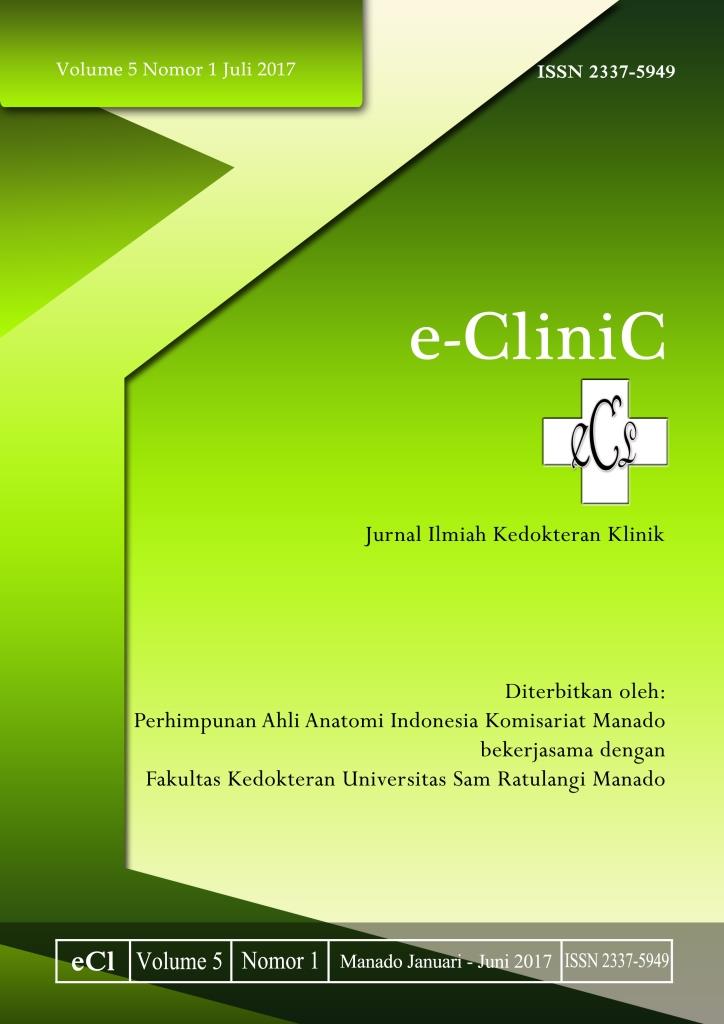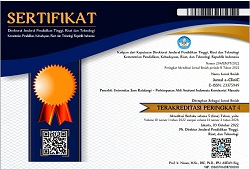Hubungan Infeksi Hepatitis Virus C Kronik dengan Kualitas Hidup Pasien Penyakit Ginjal Kronik yang Menjalani Hemodialisis Reguler
DOI:
https://doi.org/10.35790/ecl.v5i1.14699Abstract
Abstract: Chronic kidney disease (CKD) is a pathophysiologic process with diverse etiology, resulting in a progressive decline of renal function, and generally end up with kidney failure. CKD is a clinical condition characterized by the irreversible decline in kidney function requiring renal replacement therapy such as dialysis or kidney transplantation. This study was aimed to determine the relationship between chronic hepatitis C virus with the quality of life of patients with CKD who underwent regular hemodialysis. This was an observational analytical study with a cross sectional design. Samples were CKD patients undergoing hemodialysis who were infected with hepatitis C virus in chronic hemodialysis at Installation of Special Measures Section Prof. Dr. R. D. Kandou Hospital Manado from October to December 2015. The results showed that there were 82 people as samples. Thirty-one (36.6%) of them were patients with CKD who were infected with chronis hepatitis C. Most samples were male as many as 54 patients (65.9%) and 18 of them were infected with chronic hepatitis C virus. The age group 39-47 years was the largest age group as many as 10 patients (33.33%). The analysis of the relationship of anti-HCV and quality of life was tested with a correlation coefficient point biserial (p=0.327). Conclusion: There were no relationship between chronic hepatitis C virus infectionand the quality of life in patients with chronic kidney disease undergoing regular hemodialysis.
Keywords: CKD, chronic hepatitis C virus infection, quality of life
Â
Abstrak:Penyakit ginjal kronik(PGK) adalah suatu proses patofisiologis dengan etiologi yang beragam, mengakibatkan penurunan fungsi ginjal yang progresif, dan pada umumnya berakhir dengan gagal ginjal. PGK adalah suatu keadaan klinis yang ditandai dengan penurunan fungsi ginjal yang ireversibel yang memerlukan terapi pengganti ginjal berupa dialisis atau transplantasi ginjal. Penelitian ini bertujuan untuk mengetahui hubungan hepatitis virus C kronik dengan kualitas hidup pasien PGK yang menjalani hemodialisis reguler. Jenis penelitian ialah observational analitik dengan desain potong lintang. Sampel penelitian ialah pasien PGK yang menjalani hemodialisis yang terinfeksi virus hepatitis C kronik di Instalasi Tindakan Khusus Hemodialisis Bagian/SMF Ilmu Penyakit Dalam RSUP Prof. Dr. R. D. Kandou Manado periode Oktober-Desember 2015. Hasil penelitian mendapatkan jumlah sampel sebanyak 82 orang. Tiga puluh orang (36,6%) diantaranya ialah penderita PGK yang terinfeksi hepatitis C kronik. Jenis kelamin terbanyak ialah laki-laki sebanyak 54 penderita (65,9%) dan 18 diantaranya terinfeksi virus hepatitis C kronik. Kelompok usia 39-47 tahun merupakan kelompok usia terbanyak yaitu 10 orang (33,33%). Hasil analisis hubungan anti-HVC dan kualitas hidup yang diuji dengan koefisien korelasi point biserial mendapatkan niai p=0,327. Simpulan: Tidak terdapat hubungan antara infeksi virus hepatitis C kronik dan kualitas hidup pada pasien PGK yang menjalani hemodialisa reguler
Kata kunci: penyakit ginjal kronik, infeksi virus hepatitis C kronik, kualitas hidup
Downloads
How to Cite
Issue
Section
License
COPYRIGHT
Authors who publish with this journal agree to the following terms:
Authors hold their copyright and grant this journal the privilege of first publication, with the work simultaneously licensed under a Creative Commons Attribution License that permits others to impart the work with an acknowledgment of the work's origin and initial publication by this journal.
Authors can enter into separate or additional contractual arrangements for the non-exclusive distribution of the journal's published version of the work (for example, post it to an institutional repository or publish it in a book), with an acknowledgment of its underlying publication in this journal.
Authors are permitted and encouraged to post their work online (for example, in institutional repositories or on their website) as it can lead to productive exchanges, as well as earlier and greater citation of the published work (See The Effect of Open Access).







